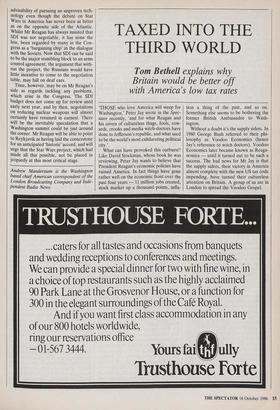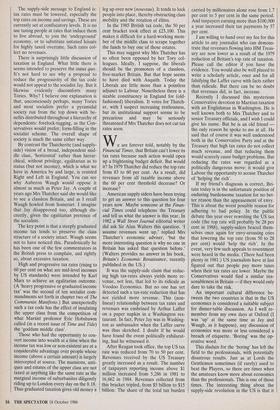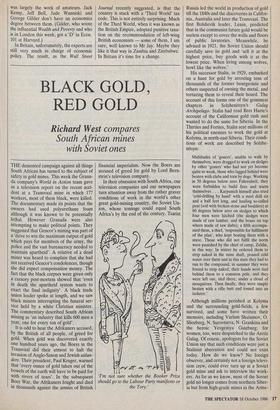TAXED INTO THE THIRD WORLD
Tom Bethel! explains why
Britain would be better off with America's low tax rates
'THOSE who love America will weep for Washington,' Peter Jay wrote in the Spec- tator recently, 'and for what Reagan and his coven of cultureless thugs, fools, cow- ards, crooks and media witch-doctors have done to Jefferson's republic, and what used to be the world's most exhilarating political city.'
What can have provoked this outburst? Like David Stockman, whose book he was reviewing, Peter Jay wants to believe that President Reagan's economic policies have ruined America. In fact things have gone rather well on the economic front over the past four years — 11 million jobs created, stock market up a thousand points, infla-
tion a thing of the past, and so on. Something else seems to be bothering the former British Ambassador to Wash- ington.
Without a doubt it's the supply siders. In 1980 George Bush referred to their phi- losophy as Voodoo Economics (hence Jay's reference to witch doctors). Voodoo Economics later became known as Reaga- nomics — until it turned out to be such a success. The bad news for Mr Jay is that the supply siders, their victory in America almost complete with the new US tax code impending, have turned their cultureless attention on Britain. A group of us are in London to spread the Voodoo Gospel. The supply-side message to England is: tax rates must be lowered, especially the top rates on income and savings. These are currently set at confiscatory levels. It is no use taxing people at rates that induce them to live abroad, to join the 'underground' economy, or to substitute untaxed leisure for highly taxed overtime. Such rates col- lect no revenues.
There is surprisingly little discussion of taxation in England. What little there is seems intended to preserve the status quo. It's not hard to see why a proposal to reduce the progressivity of the tax code would not appeal to the socialist Jay. But it likewise evidently discomforts many Tories. Why? I believe one explanation is that, unconsciously perhaps, many Tories and most socialists prefer a pyramidal society run from the top down with be- nefits distributed throughout a hierarchy of dependents: forelock-tugging, as the Con- servatives would prefer; form-filling in the socialist scheme. The overall shape of society is much the same either way.
By contrast the Thatcherite (and supply- side) vision of a broad, independent mid- dle class, 'horizontal' rather than hierar- chical, without privilege, egalitarian as to status (but not income), which is what we have in America by and large, is resisted Right and Left in England. You can see why Auberon Waugh would oppose it almost as much as Peter Jay. A couple of years ago Mrs Thatcher said she would like to see a classless Britain, and as I recall Waugh howled from Somerset. I imagine that Jay disapproved too, although dis- creetly, given the egalitarian pretence of the socialists.
The key point is that a steeply graduated income tax tends to preserve the class structure of a society intact. Waugh seems not to have noticed this. Paradoxically he has been one of the few commentators in the British press to complain, and rightly so, about excessive taxation.
High and progressive tax rates (rising to 60 per cent on what are mid-level incomes by US standards) were intended by Karl Marx to achieve an egalitarian outcome. (A 'heavy progressive or graduated income tax' was the second of ten socialist com- mandments set forth in chapter two of The Communist Manifesto.) But unexpectedly such a tax code has the effect of insulating the upper class from the competition of what Marxist professor Eric Hobsbawm called (in a recent issue of Time and Tide) the `goddam middle class'.
Those who had the opportunity to con- vert income into wealth at a time when the income tax was low or non-existent are at a considerable advantage over people whose income (above a certain amount) is largely intercepted at source. The mansions, anti- ques and estates of the upper class are not taxed at anything like the same rate as the marginal income of suburbanites diligently riding up to London every day on the 8.18. Thus graduated taxation gives old money a leg up over new (nouveau). It tends to lock people into place, thereby obstructing class mobility and the rotation of elites.
In the 1985 British tax code, the 50 per cent bracket took effect at £23,100. This makes it difficult for a hard-working mem- ber of the middle class to scrape together the funds to buy one of those estates.
This may suggest why Mrs Thatcher has so often been opposed by her Tory col- leagues. Ideally, I suppose, the liberals should be the promoters of a classless, free-market Britain. But that hope seems to have died with Asquith. Today the Liberals are little more than a pointless adjunct to Labour. Nonetheless there is a sizable constituency in England for (old- fashioned) liberalism. It votes for Thatch- er, with I suspect increasing restlessness, but its institutional support seems to be precarious and may be seriously threatened if Mrs Thatcher does not cut tax rates soon.
We are forever told, notably by the Financial Times, that Britain can't lower its tax rates because such action would open up a frightening budget deficit. But would it? In 1979 Thatcher did reduce the top rate from 83 to 60 per cent. As a result, did revenues from all taxable income above the 60 per cent threshold decrease? Or increase?
American supply siders have been trying to get an answer to this question for four years now. Maybe someone at the Finan- cial Times could telephone the Treasury and tell us what the answer is this year. In 1982 a Wall Street Journal editorial writer did ask Sir Alan Walters this question. 'I assume revenues went up,' replied Mrs Thatcher's economic adviser, 'but the more interesting question is why no one in Britain has asked that question before.' (Walters provides no answer in his book, Britain's Economic Renaissance, recently published in the US.) It was the supply-side claim that reduc- ing high tax-rates always yields more re- venue, not less, that led to its ridicule as Voodoo Economics. But no one has yet detected such a tax-rate reduction that has not yielded more revenue. This (non- linear) relationship between tax rates and revenues was enshrined by Arthur Laffer on a paper napkin in a Washington res- taurant. In fact, Peter Jay was in Washing- ton as ambassador when the Laffer curve was thus sketched. I doubt if he would have found the event politically exhilarat- ing, had he witnessed it.
After Reagan took office, the top US tax rate was reduced from 70 to 50 per cent. Revenues received by the US Treasury greatly increased as a result. The number of taxpayers reporting income above $1 million increased from 5,286 in 1981 to 16,662 in 1984. Revenues collected from this bracket tripled, from $5 billion to $15 billion. The share of the total tax burden carried by millionaires alone rose from 1.7 per cent to 5 per cent in the same period. And taxpayers earning more than $100,000 a year increased their tax payments by 57 per cent.
I am willing to hand over my fee for this article to any journalist who can demons- trate that revenues flowing into HM Treas- ury are now lower as a result of the 1979 reduction of Britain's top rate of taxation. Please call the editor if you have the evidence. You would also be well placed to write a scholarly article, once and for all falsifying the Laffer curve with facts rather than ridicule. But there can be no doubt that revenues did, in fact, increase.
Recently I discussed this mysterious Conservative devotion to Marxian taxation with an Englishman in Washington. He is well known both to Mrs Thatcher and to senior Treasury officials, and I wish I could give his name. But he is an old friend — the only reason he spoke to me at all. He said that of course it was well understood both in the Conservative Party and at the Treasury that high tax rates do not collect much revenue, and that reducing them would scarcely cause budget problems. But reducing the rates was regarded as a politically dangerous move: it would give Labour the opportunity to accuse Thatcher of 'helping the rich'.
If my friend's diagnosis is correct, Bri- tain today is in the unfortunate position of enduring burdensome taxation for no bet- ter reason than the appeasement of envy. This is about the worst possible reason for adhering to bad policy. In the public debate this year over rewriting the US tax code (the top rate will probably be 28 per cent in 1988), supply-siders braced them- selves once again for envy-arousing cries that lowering the top rate (from 50 to 28 per cent) would 'help the rich'. In the event, very few such appeals to resentment were heard in the media. (There had been plenty in 1981.) US journalists have at last figured out that people pay more taxes when their tax rates are lower. Maybe the Conservatives would find a similar rea- sonableness in Britain — if they would only dare to take the risk.
An important cultural difference be- tween the two countries is that in the US economics is considered a suitable subject for dinner-table discussion. As I well re- member from my own days at Oxford (I was 'up' at the same time as Jay and Waugh, as it happens), any discussion of economics was more or less considered a breach of etiquette. 'Boring' was the op- erative word.
This disdain for the 'boring' has left the field to the professionals, with potentially disastrous results. Just as at Lords the Gentlemen sometimes (if rarely) used to beat the Players, so there are times when the amateurs know more about economics than the professionals. This is one of those times. The interesting thing about the supply-side revolution in the US is that it was largely the work of amateurs. Jack Kemp, Jeff Bell, Jude Wanniski and George Gilder don't have an economics degree between them. (Gilder, who wrote the influential Wealth and Poverty and who is in London this week, got a 'TY in Econ. 101 at Harvard.) In Britain, unfortunately, the experts are still very much in charge of economic policy. The result, as the Wall Street Journal recently suggested, is that the country is stuck with a 'Third World' tax code. This is not entirely surprising. Much of the Third World, when it was known as the British Empire, adopted punitive taxa- tion on the recommendation of left-wing British economists — some of them, I am sure, well known to Mr Jay. Maybe they like it that way in Zambia and Zimbabwe. In Britain it's time for a change.




















































 Previous page
Previous page